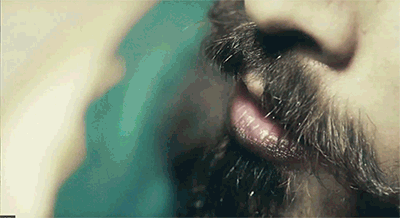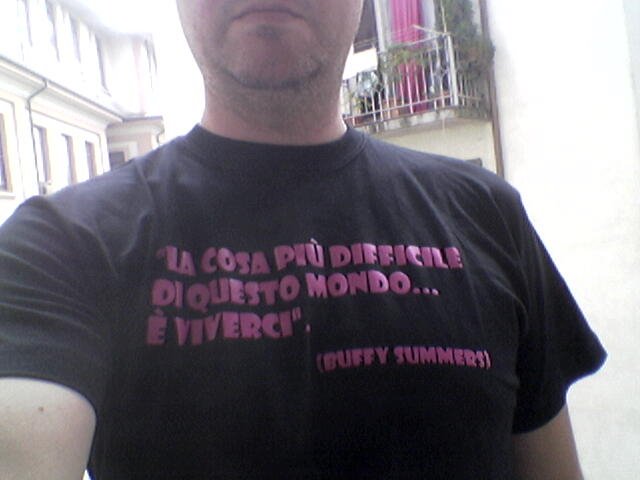sabato 3 giugno 2017
venerdì 2 giugno 2017
NEWS - "Fargo": "improbabile un'altra stagione"
News tratta da "Slashfilm"
News tratta da "Slashfilm"
Noah Hawley doesn’t know if he’ll make another season of Fargo. He’s said so himself in the past. When he’s working on a season of the acclaimed FX series, he’s not thinking about the future. Hawley is telling one story at a time. If he has another story to tell, he’ll tell it, but he’s in no hurry. To FX’s credit, they’re not already pushing for more. Below, FX Chief John Landgraf comments on whether we’ll see Fargo season 4 happen or not. We’re midway through another excellent season of Fargo. With only three seasons so far, the show’s creator has taken his time by not cranking out a season every year. FX chief John Landgraf has no interest in doing that either, from the sound of it. Unless Hawley wants to go back to Minnesota, season three could be the end of Fargo, which is what John Landgraf told The Hollywood Reporter:
There may never be another Fargo. Unless [creator Noah Hawley] has an idea for Fargo that he thinks he can make as good as the prior three. I think once people get to the end of this [season] they will find that it is thematically different. It’s really about the moment we live in now.
Fargo fans probably would rather never see another season of Fargo instead of a rushed one. What’s comforting is Hawley is an idea man, someone who can make completely different shows like Fargo and Legion, write novels, and maybe even go from directing television to film. You’d imagine someone with his imagination would think of another Fargo story to tell, but we’ll have to wait and see if he does. As he said, he’s okay waiting four years to return to the show if the inspiration strikes, but there is, as Landgraf pointed out, the possibility of that not happening.
giovedì 1 giugno 2017
PICCOLO GRANDE SCHERMO - Affogateli tutti! Nonostante l'ondata di critiche dopo aver distrutto il mito di "Baywatch" con un film da denuncia al WWF delle serie tv di culto (da oggi nelle sale), i produttori pensano già al sequel
News tratta da "Slashfilm"
News tratta da "Slashfilm"
Baywatch has faced a tsunami of middling to bad reviews, but that won’t stop the comedy-action movie from jetting forward to a sequel, and possibly, a franchise. Producers and writers are already planning a sequel to Baywatch with the cast, led Dwayne Johnson and Zac Efron, returning in their roles. Baywatch itself is a big-screen reboot of the popular ’90s TV show starring David Hasselhoff and Pamela Anderson, and a sequel would somewhat follow the footsteps of the successful movie reboot of 21 Jump Street. Though, according to reviews, that’s the only thing they have in common. Baywatch producer Beau Flynn told Variety that he and writers Damian Shannon and Mark Swift, who co-wrote the script for the first movie, have a rudimentary plan for Baywatch 2.
“We have an amazing story already. We’re bringing back Shannon and Swift who wrote on the first one, and I know Dwayne would be in, I know Zac and all the girls would be. We just have this really cool idea to put them in this whole new world. We would take it overseas.”
The “girls” in the cast that he mentions are Priyanka Chopra, Alexandra Daddario and Kelly Rohrbach, and other cast members include Jon Bass and Ilfenesh Hadera. They all seem game for another lap at the Baywatch pool, according to Variety.
Rohrbach, who made her feature film debut in Baywatch and takes over Pamela Anderson’s role from the original series, was especially excited.
“Of course! I couldn’t have asked for a better cast on my first film. These guys are awesome. They’re hilarious, they’re loving, they’re generous. We really were a family and I think that comes though on the screen, as well.” Daddario agreed, adding: “Yes! I would love to. I think it’s very cool to be part of a franchise, and I think it helps get other work. It’s fun. You get to travel the world and work with these amazing people, and you get to make people laugh, so I’m completely down for it.”
Chopra is the villain of the film so it seems unlikely she’ll return for the second. And what of Johnson and Efron? Well, Johnson is this movie’s most dedicated hype man, and is one of the driving forces behind the movie making it to the big screen, acting as the lead star and producer. With Johnson at the forefront of other massive blockbusters like Fast and Furious, the upcoming Jumanji, and solo supervillain movie Black Adam, the world’s best paid actor would have his hands full. But he would probably sign on for a sequel anyway.
Etichette:
21 Jump Street,
Alexandra Daddario,
Baywatch,
David Hasselhoff,
Dwayne Johnson,
Kelly Rohrbach,
Pamela Anderson,
PICCOLO GRANDE SCHERMO,
Priyanka Chopra,
Zac Efron
mercoledì 31 maggio 2017
GOSSIP - La strana coppia è ufficiale! Norman Reedus e Diane Kruger cinguettano innamorati persi per via di Cannes...
This might make Norman Reedus and Diane Kruger Instagram official! The private couple shared a cute exchange on Instagram after Normanposted a photo of Diane to congratulate her on her Best Actress win at the 2017 Cannes Film Festival.
“YESSSSS ♥️♥️♥️,” Norman sweetly wrote along with a gorgeous snap from the event.
Diane even took to her own Instagram to write back to Norman, calling him “babe.”
“Omg !!!!!!!!!!!!! Babe !!!!!!!! ♥️♥️♥️♥️♥️♥️♥️♥️,” Diane wrote in the caption section, adding in plenty of heart emojis!
martedì 30 maggio 2017
L'EDICOLA DI LOU - Stralci, cover e commenti sui telefilm dai media italiani e stranieri
CORRIERE DELLA SERA
Il nuovo "Twin Peaks" ai confini dell'esercizio di stile
"Passato qualche giorno dal lancio mondiale dei nuovi episodi, circondati da un'attesa febbrile, possiamo fare qualche riflessione a mente più lucida sul ritorno di «Twin Peaks» (Sky Atlantic, venerdì, 21.10). Dalla sua prima apparizione nel figgo, la serie è diventata un culto tv: alcuni spettatori ne hanno letto il senso più profondo e autoriale, altri si sono fermati a una lettura più superficiale, elevando a icona le sue manie e i suoi tic ricorrenti (il registratore, la torta di ciliegie e il caffè, il ceppo, ...). Indubbiamente, la serie è stata fondamentale per riconoscere che anche la vituperata tv poteva avere un valore culturale, se persino un autore come Lynch non disdegnava di farci i conti. A distanza di oltre 25 anni, l'effetto è allo stesso tempo affascinante (soprattutto per i nostalgici) e straniante. Nel mezzo ci sono stati capolavori come «I Soprano» e «Breaking Bad» ad abituare il pubblico alla complessità. La serie originale partiva facilitata da una domanda dritta e chiara. Domandandosi «Chi ha ucciso Laura Palmer », s'iniziava a seguire la serie aspettandosi un classico thriller e si finiva avvinti in un reticolo di misteri insondabili, in una riflessione onirica sul doppio, fitta di riferimenti paranormali. Oggi, invece, è come se Lynch non sentisse più il bisogno di venire a patti con le convenzioni del linguaggio tv, e non sempre questo è un bene. Emily L. Stephens ha scritto su The A.V. Club che i nuovi episodi sono «espressione senza filtri della poetica di Iynch, liberi dalle costrizioni di genere e di struttura della soap opera, del poliziesco e del thriller, che diedero forma al primo Twin Peaks». Difficile dopo soli due episodi farsi un'idea precisa di dove andrà a parare il racconto: il fascino della serialità sta proprio in questo lento rimandare e dilazionare il senso. Se il primo episodio «avvince» nella sua stranezza, il secondo apre a una deriva grottesca che in certi punti fa cadere la serie nel puro esercizio di stile". (Aldo Grasso)
CORRIERE DELLA SERA
Il nuovo "Twin Peaks" ai confini dell'esercizio di stile
"Passato qualche giorno dal lancio mondiale dei nuovi episodi, circondati da un'attesa febbrile, possiamo fare qualche riflessione a mente più lucida sul ritorno di «Twin Peaks» (Sky Atlantic, venerdì, 21.10). Dalla sua prima apparizione nel figgo, la serie è diventata un culto tv: alcuni spettatori ne hanno letto il senso più profondo e autoriale, altri si sono fermati a una lettura più superficiale, elevando a icona le sue manie e i suoi tic ricorrenti (il registratore, la torta di ciliegie e il caffè, il ceppo, ...). Indubbiamente, la serie è stata fondamentale per riconoscere che anche la vituperata tv poteva avere un valore culturale, se persino un autore come Lynch non disdegnava di farci i conti. A distanza di oltre 25 anni, l'effetto è allo stesso tempo affascinante (soprattutto per i nostalgici) e straniante. Nel mezzo ci sono stati capolavori come «I Soprano» e «Breaking Bad» ad abituare il pubblico alla complessità. La serie originale partiva facilitata da una domanda dritta e chiara. Domandandosi «Chi ha ucciso Laura Palmer », s'iniziava a seguire la serie aspettandosi un classico thriller e si finiva avvinti in un reticolo di misteri insondabili, in una riflessione onirica sul doppio, fitta di riferimenti paranormali. Oggi, invece, è come se Lynch non sentisse più il bisogno di venire a patti con le convenzioni del linguaggio tv, e non sempre questo è un bene. Emily L. Stephens ha scritto su The A.V. Club che i nuovi episodi sono «espressione senza filtri della poetica di Iynch, liberi dalle costrizioni di genere e di struttura della soap opera, del poliziesco e del thriller, che diedero forma al primo Twin Peaks». Difficile dopo soli due episodi farsi un'idea precisa di dove andrà a parare il racconto: il fascino della serialità sta proprio in questo lento rimandare e dilazionare il senso. Se il primo episodio «avvince» nella sua stranezza, il secondo apre a una deriva grottesca che in certi punti fa cadere la serie nel puro esercizio di stile". (Aldo Grasso)
lunedì 29 maggio 2017
NEWS - Anche per Netflix c'è una prima volta. Ecco il motivo della cancellazione del costosissimo "The Get Down" (e non si tratta di budget), il primo titolo del servizio streaming a non essere rinnovato
News tratta da "Variety"
Netflix had never canceled an original scripted drama series — until this week. On Wednesday, the streaming service pulled the plug on “The Get Down,” one of the most expensive series in television history, with a first season that cost at least $120 million for 10 episodes. Despite recent assurances that creator Baz Luhrmann that a second season was in the offing, Netflix decided not to move forward with the Sony Pictures Television show. According to data from research firm Parrot Analytics, U.S. viewer demand for “The Get Down” never matched that of buzzier Netflix shows such as “Stranger Things” and “The Crown.” It also failed to outshine comparable linear series, including HBO’s canceled “Vinyl.” Parrot uses a proprietary demand-expression metric incorporating desire, engagement, and consumption measurements to gauge audience activity around a show. A report prepared for Variety found activity around “The Get Down” to be minimal in the weeks following its release. From Aug. 11, 2016 through May 24, 2017, “The Get Down” registered 26.6% of the viewer demand for “Stranger Things” and 83.5% of the demand for “The Crown.” “The Get Down” enjoyed a relatively strong start, with 19.8 million demand expressions in its first week on Netflix. “The Crown” was 8.3% higher with 21.4 million demand expressions in its first week, beginning Nov. 4. Netflix split season one of “The Get Down” into two parts. While the premiere of part two April 7 gave the series a slight bump in audience demand for two weeks, that bump failed to sustain, with demand quickly regressing to a lackluster baseline. Parrot also compared demand for “The Get Down” to that for two linear dramas rooted in music — Fox’s “Empire” and HBO’s “Vinyl.” Unsurprisingly, “Empire” — one of the most watched series on television — far outperformed “The Get Down” in audience demand. When compared to “Vinyl,” the “The Get Down” averaged 92% more demand than the HBO show for the Aug. 11-May 24 period. But that’s no great accomplishment, considering that “Vinyl”had been canceled long before that stretch began. In between the premieres of parts one and two of “The Get Down” season one, the series showed a baseline level of demand near or lower than a show that had already been killed. Looking at international markets, “The Get Down” was far outperformed in Brazil and France by “Stranger Things.” In Brazil, the Luhrmann series performed on par with “The Crown,” with neither able to muster much demand. In France, “The Crown” preformed slightly better.
News tratta da "Variety"
Netflix had never canceled an original scripted drama series — until this week. On Wednesday, the streaming service pulled the plug on “The Get Down,” one of the most expensive series in television history, with a first season that cost at least $120 million for 10 episodes. Despite recent assurances that creator Baz Luhrmann that a second season was in the offing, Netflix decided not to move forward with the Sony Pictures Television show. According to data from research firm Parrot Analytics, U.S. viewer demand for “The Get Down” never matched that of buzzier Netflix shows such as “Stranger Things” and “The Crown.” It also failed to outshine comparable linear series, including HBO’s canceled “Vinyl.” Parrot uses a proprietary demand-expression metric incorporating desire, engagement, and consumption measurements to gauge audience activity around a show. A report prepared for Variety found activity around “The Get Down” to be minimal in the weeks following its release. From Aug. 11, 2016 through May 24, 2017, “The Get Down” registered 26.6% of the viewer demand for “Stranger Things” and 83.5% of the demand for “The Crown.” “The Get Down” enjoyed a relatively strong start, with 19.8 million demand expressions in its first week on Netflix. “The Crown” was 8.3% higher with 21.4 million demand expressions in its first week, beginning Nov. 4. Netflix split season one of “The Get Down” into two parts. While the premiere of part two April 7 gave the series a slight bump in audience demand for two weeks, that bump failed to sustain, with demand quickly regressing to a lackluster baseline. Parrot also compared demand for “The Get Down” to that for two linear dramas rooted in music — Fox’s “Empire” and HBO’s “Vinyl.” Unsurprisingly, “Empire” — one of the most watched series on television — far outperformed “The Get Down” in audience demand. When compared to “Vinyl,” the “The Get Down” averaged 92% more demand than the HBO show for the Aug. 11-May 24 period. But that’s no great accomplishment, considering that “Vinyl”had been canceled long before that stretch began. In between the premieres of parts one and two of “The Get Down” season one, the series showed a baseline level of demand near or lower than a show that had already been killed. Looking at international markets, “The Get Down” was far outperformed in Brazil and France by “Stranger Things.” In Brazil, the Luhrmann series performed on par with “The Crown,” with neither able to muster much demand. In France, “The Crown” preformed slightly better.
Iscriviti a:
Commenti (Atom)
"Il trivial game + divertente dell'anno" (Lucca Comics)

Il GIOCO DEI TELEFILM di Leopoldo Damerini e Fabrizio Margaria, nei migliori negozi di giocattoli: un viaggio lungo 750 domande divise per epoche e difficoltà. Sfida i tuoi amici/parenti/partner/amanti e diventa Telefilm Master. Disegni originali by Silver. Regolamento di Luca Borsa. E' un gioco Ghenos Games. http://www.facebook.com/GiocoDeiTelefilm. https://twitter.com/GiocoTelefilm
Lick it or Leave it!




























.jpg)














